metalworkingmag.com
27
'23
Written on Modified on
Optimate News
Optimate offers fast, process-reliable web shop orders
Produced regionally, delivered globally - how a mid-sized job shopper became a sheet metal processing provider with a web shop.
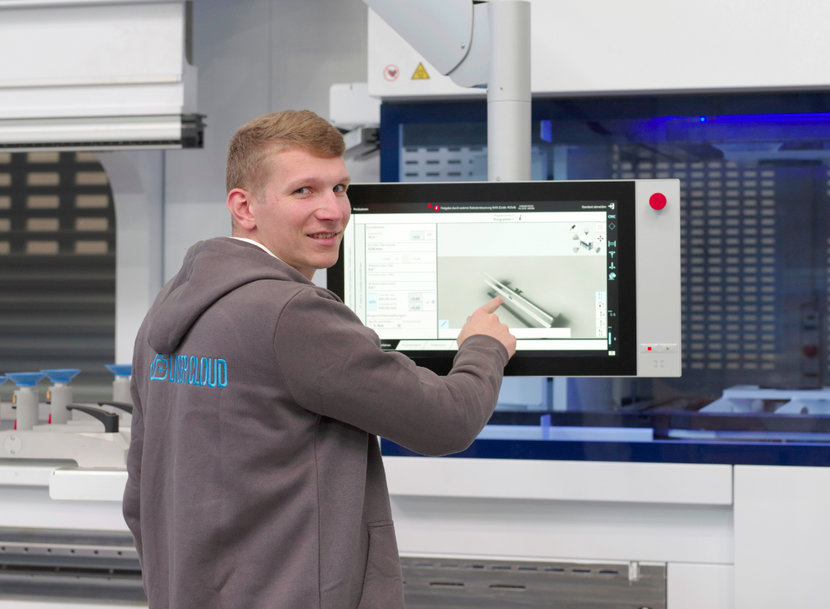
Deeg GmbH is a mid-sized job shopper for sheet metal processing. What began close to 30 years ago with a personal mortgage to finance the first TRUMPF laser cutting machine is now stepping up to the next level with the LaserCloud online ordering platform. Via TRUMPF, the sheet metal processing company came across the digitalization experts from Optimate. In a joint pilot project, an automated feasibility analysis was integrated into the web shop.
'We started off with laser processing and gradually added subsequent processes such as bending, welding and the installation of assemblies', says Joachim Deeg, explaining the company's evolution into a full-range provider of sheet metal parts. The CEO of LaserCloud GmbH had also been working in the family business before the online ordering service became an independent company a year ago.
With a workforce of 185, Deeg manufactures a diverse range of sheet metal parts in large series on laser cutting and bending machines. The spin-off's production area of 17,000 m² is equipped with cutting-edge machinery, primarily TRUMPF machines. 'There were times when we had to hire as many as ten new employees every year. And we had to expand our production area every two to three years', recalls Joachim Deeg.
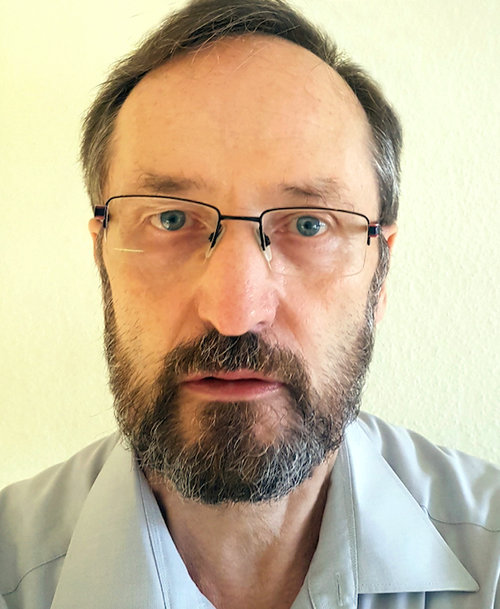
Customers are mainly large industrial companies from the region who order medium to large series of 100 to 1,000 units made of structural steel, aluminium or stainless steel. 'But we have also worked on product groups with several thousand parts over the course of a year, or on specific welded designs requiring many hours of machining on a single part', he adds.
When batch size 1 interrupts series production
Customers would repeatedly come to request smaller batch sizes or even batch size 1, for example, to have a prototype for product testing produced quickly. However, the laser machines are scheduled 7-8 days in advance for series production orders.
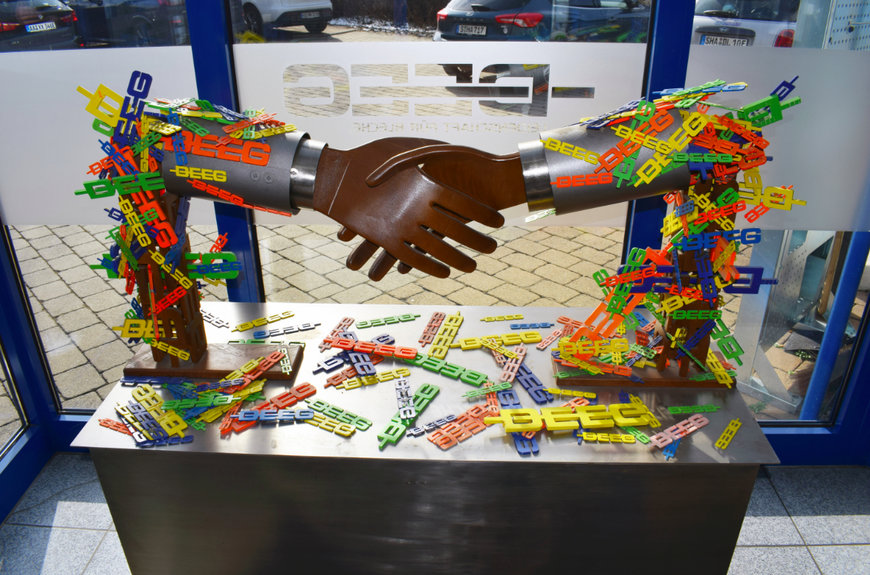
At Deeg, the job shopper for sheet metal parts in Kirchberg an der Jagst, visitors are greeted with a laser-cut and bent sheet metal handshake.
All production orders are planned and scheduled via ERP (APplus) and PPS (Oseon), 'merged' with NC order data in close-to-production work prep, and then go directly to the machines. NC programming at Deeg uses TruTops Boost almost exclusively, and SolidWorks with sheet metal adapters for a few exceptions. With synchronized production, the single and rush orders had to be managed without interrupting the series production. At times, this proved very challenging - with full order books and often in three-shift operation.
The time and effort involved was correspondingly high. 'Our delivery times are between 6 and 8 weeks. So as you can imagine, it was quite a balancing act to meet our deadlines when we had to squeeze in smaller series or prototypes', says Joachim Deeg, explaining the situation before LaserCloud was founded. As a result, some urgent requests could not be fulfilled at all - not an easy decision for regular customers.
Processing individual orders separately
'We were eager to remedy the situation and needed a solution', recalls the Managing Director. Thus, it was decided to set up a separate, fully dedicated department. A new hall was built, and the company's own machinery was acquired in order to be able to manufacture individual orders separately from series production. The aim was not to process these orders via the standard order entry system, but instead to be handled entirely separately, if possible through an online platform. The new ordering philosophy at Deeg evolved as follows: If all you need is a simple bent part, you can order it via the web shop and have it delivered within a few days.

Joachim Deeg from LaserCloud (right) demonstrates a processed sheet metal part
Those who want to order full series can simply continue as usual via order processing. The new department soon became its own company: LaserCloud GmbH. A TruLaser 3030 fiber laser cutting machine, a TruBend 5170 press brake, an Arku sheet metal deburring machine and a Fladder deburring machine are available for the quick web orders. 'At LaserCloud, we are extremely flexible because we have our own machines. If a customer needs their sheet metal part the very next day, we can deliver', promises Joachim Deeg.
To ensure that a single order can be processed this quickly, the 15 employees at LaserCloud need to master all the machining processes required to completely manufacture a sheet metal part and then assemble it. At the parent company, there are separate departments for laser cutting, deburring, welding and bending. 'We need exceptionally versatile employees who can handle everything. It's what enables us to deliver within just a few hours', explains LaserCloud's Managing Director.
Web shop for single rush orders
'At the time, I wondered why there wasn't any software available for a job shopper in sheet metal processing to create a web shop and handle the small batches and single parts online.' Software developers acquainted with the junior CEO suggested that such a project would be a real money pit. But Joachim Deeg wasn't ready to give up. Customers insisted that they wanted to place the small orders with their long-standing sheet metal partner - without, however, having to deal with long delivery times.
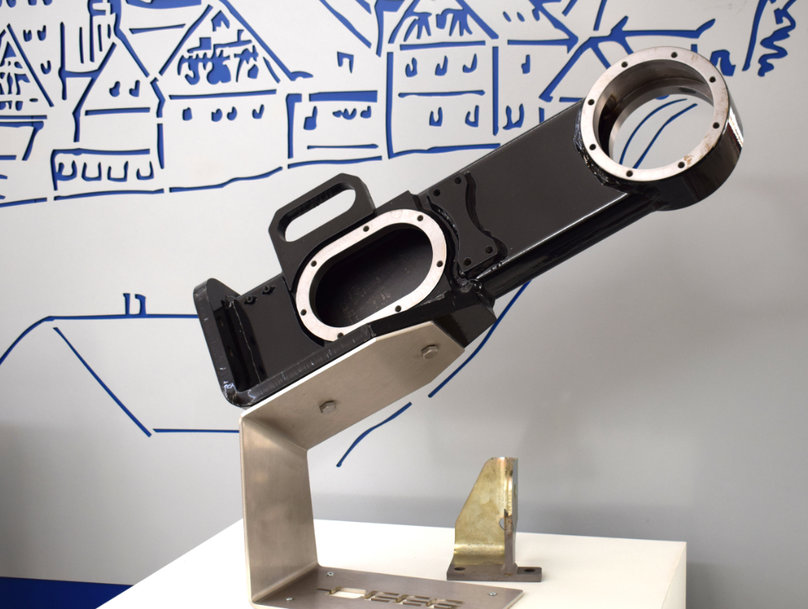
What Deeg produces in larger series, LaserCloud carries out for single orders: high-precision sheet metal processing.
Through his contacts at TRUMPF, Deeg then became aware of RockIT Manufacturing as a potential web shop provider. The Ditzingen-based IT specialists, including former TRUMPF employees, create online shops for industrial companies - and especially for sheet metal processors. Once the web shop was designed for LaserCloud, online orders could be placed, but the design department still had to check the feasibility of each part.'
What good is a digital ordering process if we have to intervene manually every time? The web shop then becomes a one-way street', points out Joachim Deeg. His vision was to integrate a running cost calculation for the many single orders - along with a feasibility analysis - into the web shop, so that everything could run as automatically as possible.
Specifications for the feasibility analysis
RockIT then integrated the cost calculation into the LaserCloud shop and referred to the Optimate start-up when it came to feasibility analysis. The cost calculation was quickly integrated, RockIT adapted the interface, as well as the link to the Optimate solution. 'We had estimates of up to two years to integrate the feasibility analysis into our web shop', recalls Joachim Deeg. 'But what manufacturing company can afford to wait two long years until the feasibility check for sheet metal parts is implemented in the web shop? Optimate doesn't think in terms of years, but in short sprints.' The start-up's software development team was able to implement the first operational programs within two weeks.
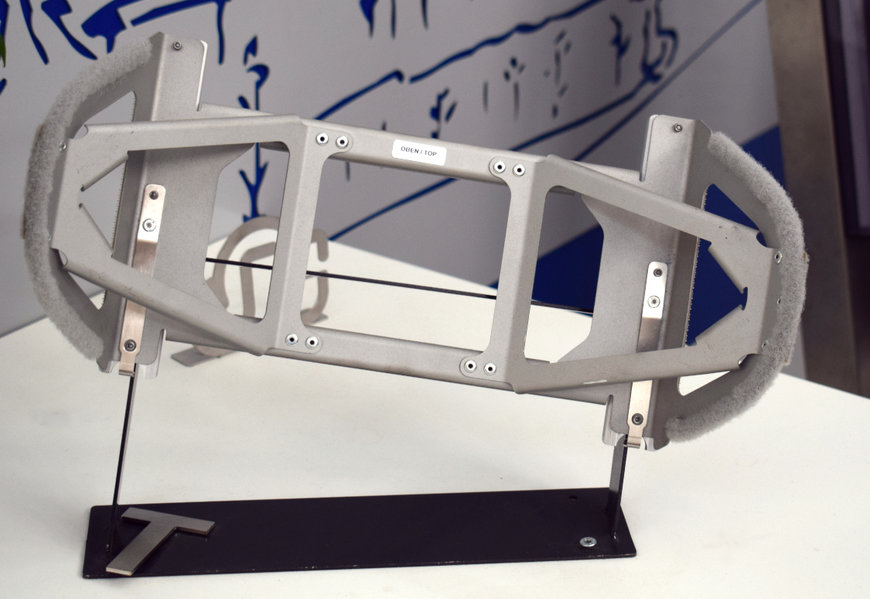
A set of specifications defined what LaserCloud expected from a feasibility analysis. It was important to Joachim Deeg that there is both a design and a production check. 'Our goal was that when feasibility was checked, i.e. once the part was ready to go, the stored STEP file could then be uploaded directly into our CAD program with a simple click to create the NC program. We then worked through all eventualities and determined what we would have to contribute from our side.'
Two LaserCloud employees were entrusted with technical clarification. Together with the Deeg specialists in programming, design and work prep, topics such as laser processing, cutting and others were discussed. The in-house bending department's expertise was also indispensable to determining where it would be necessary to adapt the designed customer parts and what kind of feasibility analysis could be considered for bending.' In a project team here at LaserCloud, we kept interfacing with Deeg, we then spoke with RockIT and Optimate and maintained the specifications. It was a challenge for us to translate all our technical expertise into this software thinking.' Feasibility means design and production checks.
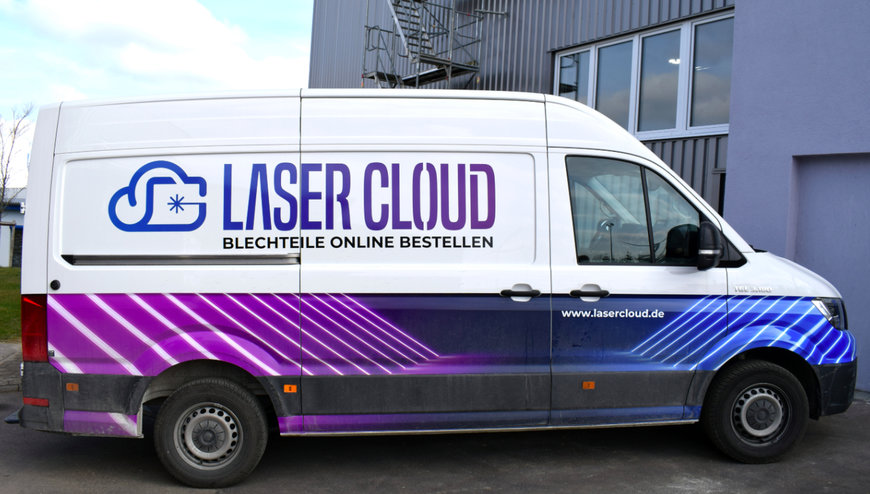
LaserCloud employees produce single and rush orders within as few as 2-3 days, and delivery also needs to be kept to a minimum. Sheet metal parts are delivered to the regional customers in own vans.
If a web shop user uploads their part to the platform as a design drawing in STEP or DFX format, the first step is the feasibility analysis. Specifically, it checks whether the part can be produced in terms of design - including bending radius, contours and flange lengths. The customer then enters their material and other parameters for the production test. The sheet metal processor's machine and tool data were stored for just this purpose.
Based on these characteristics, the digital feasibility analysis checks whether the ordered part can be produced with the machines at LaserCloud. Initially, it was still unclear just how reliable this would be, and whether the orders would actually run as planned. Of course, nobody wanted half the parts to be rejected by the feasibility analysis. A balance had to be found.
On the one hand, it was important not to reject too many online orders, but on the other, the company wanted to ensure that the parts that passed the feasibility check could actually be produced with a high level of reliability. 'The fact that Optimate has in-depth sheet metal knowledge in addition to software expertise was a major advantage', points out the LaserCloud Managing Director. For example, in terms of the 3D feasibility of bent parts: How are parts being bent, with what radius and minimum flange length? 'We've always been able to get right into the technical aspects without having to explain things in great detail'.
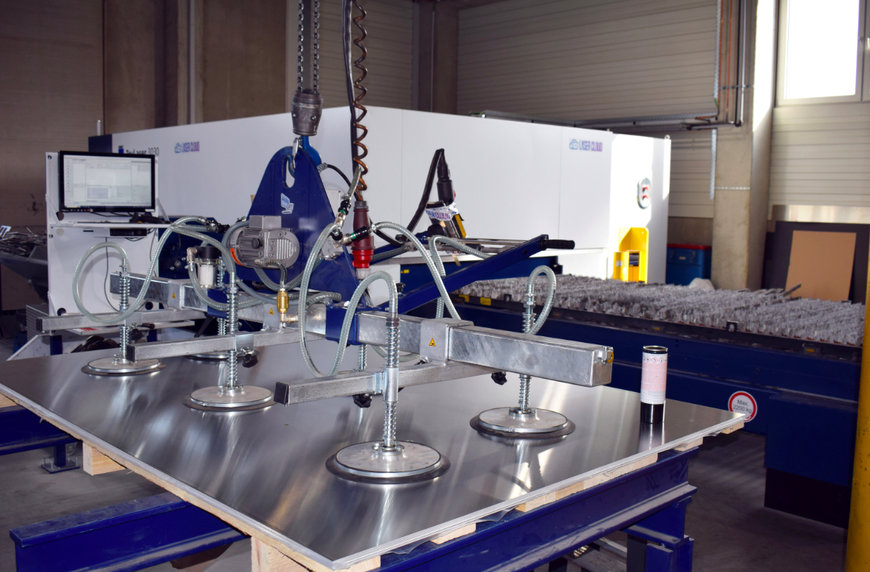
As online orders increase, there will still be space available in LaserCloud's new production hall for more sheet metal processing machines.
Should the Optimate feasibility analysis reject a part, it can be placed into a second shopping cart with non-calculable parts. In this case, an order isn't generated, and the design data and entered parameters are sent to the design department for manual checking. Typical errors that are not passed through the design check are open contours, duplicate contours, multiple parts in a file, incorrect line colors, different sheet thicknesses in a part, or a drawing header with a legend contained in the file. In production testing, a typical reason for rejection is the wrong part size for the large-format laser cutting machine or incorrect sheet thickness. During bending, parts longer than three meters are rejected since they can't be run on the machine.
Benefiting twice from the extended workbench
LaserCloud's new laser and bending machine was delivered in August last year. Precisely at that time, a large Deeg customer had an additional and substantial sheet metal requirement. So, in fact, the first order for the web shop was a large series, which wasn't even ordered online.
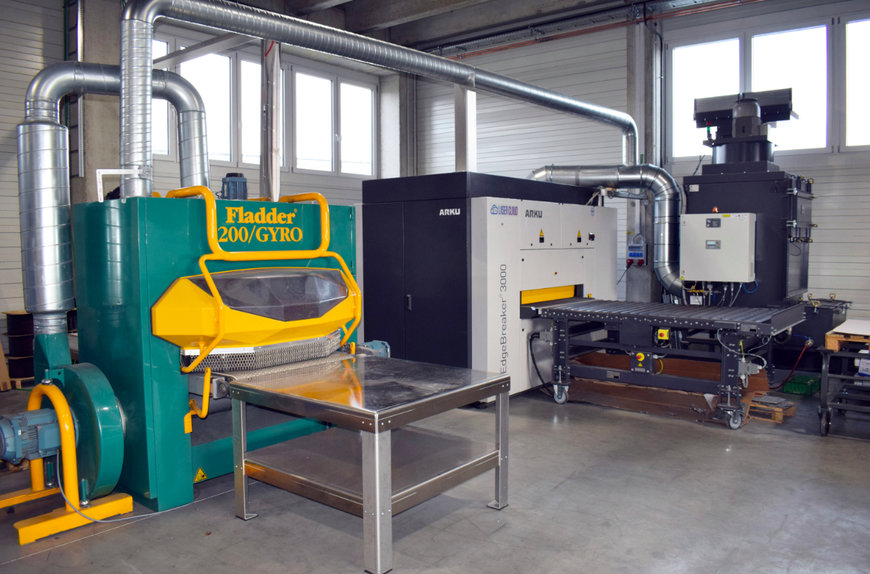
The online shop was launched in October. Since then, orders have been coming in daily. 95 percent of them are new customers and none of them are existing customers of the parent company. 100 customers are currently registered, and the trend is increasing. One customer for whom the LaserCloud online ordering platform has served as an extended workbench now places 400 orders a week via the web shop - all of them single parts with batch sizes of 1 to 5.
In the medium term, job shopper Deeg also benefits from the new subsidiary. Anyone who orders single sheet metal parts from LaserCloud today may well become a high-volume customer tomorrow. Joachim Deeg explains: 'If a new customer needs a prototype of one or two parts, for example, they can order them from us, receive their delivery within a few days and test them. If the tests run successfully and the customer wants to go into series production, our parent company is available to take it on.'
From the web shop to the machine
Currently, the programs are still imported manually into the CAD system, and an in-house designer looks over them. In the future, however, it is planned that the CAD programs will be automatically filled with the uploaded STEP files following the feasibility analysis. 'We want to get a feel for what kind of orders and parts are actually coming in via the web shop, which is why we're taking another look at it in the design department', says Joachim Deeg, explaining his approach. If it becomes clear in a few months that the ordering process and analysis run smoothly, then the entire process, including NC programming, will be automated.
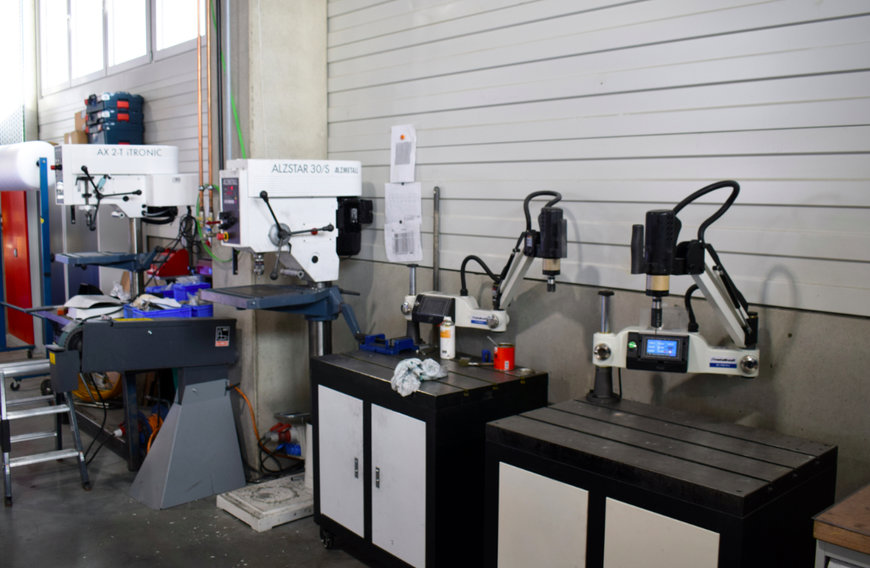
A number of smaller machines are available if a hole needs to be drilled or a thread needs to be cut in one of the single parts.
Technically, LaserCloud is already capable of automatically transferring an online order into the NC program following the feasibility analysis, as well as entering it directly into the PPS. But for now, Joachim Deeg and his colleagues prefer to take another look at it themselves. 'Once we are confident that everything is running smoothly, we'll switch over to automation here as well. And we'll be a real step closer to paperless production', he concludes.
4 questions for Joachim Deeg (JD)
Mr. Deeg, if you were to launch LaserCloud today, what would you do differently?
JD: To be honest, nothing at all. We found the ideal digitalization partners for our web shop project with RockIT and Optimate, who also have a thorough understanding of our business as a job shopper in sheet metal processing. They know exactly what unfolding, bend lines and bending radius are, and which parameters are decisive for the feasibility analysis. Right from day one, we spoke the same language.
But for us, as sheet metal processor, it wasn't always easy to understand the IT language and how software like this is programmed. We were in fact a pilot customer for the integration of the feasibility analysis into the online shop. We quickly saw that they are true professionals who, in spite of some initial challenges, always searched for and found the best possible solution.
What was the biggest challenge you faced?
JD: We had several in-depth discussions about the feasibility analysis with the Deeg production and design experts looking at all the relevant parameters. At times, it felt like a never-ending task. Calculating the press force based on material, bending length, radius and selected tool with minimum and maximum flange length was certainly complex. For this purpose, we stored a tool database in the Optimate App and now use a matrix to recognize which tools we can bend with and whether a 170t press force is sufficient.
What was most surprising to you?
JD: The fact that we were able to build up a small knowledge database about sheet metal processing along the way came as a surprise. It enables us to see what has actually been done at any point in time, for example during the feasibility analysis. Everything that we store digitally for technical feasibility is also documented clearly in text form. As a result, there are various knowledge pages in the web shop: for example that the minimum radius has to correspond to the sheet thickness. Before someone starts to design, they can take a look there.
And where do you still see potential for optimization?
JD: On the one hand, we would like to see a part visualized in 3D in the web shop with the detected defects, interfering contours, etc. - so that the web shop user can see why their part was rejected as unfinishable. On the other hand, it would be ideal if this is also displayed to us on the bending machine. For example, if a cutout is located too close to the bending zone, the operator sees it and can watch out for it during bending. And, of course, we would be absolutely thrilled if the AI-based potential recognition and automated redesign from Optimate could also be integrated into the web shop.
www.optimate.com

